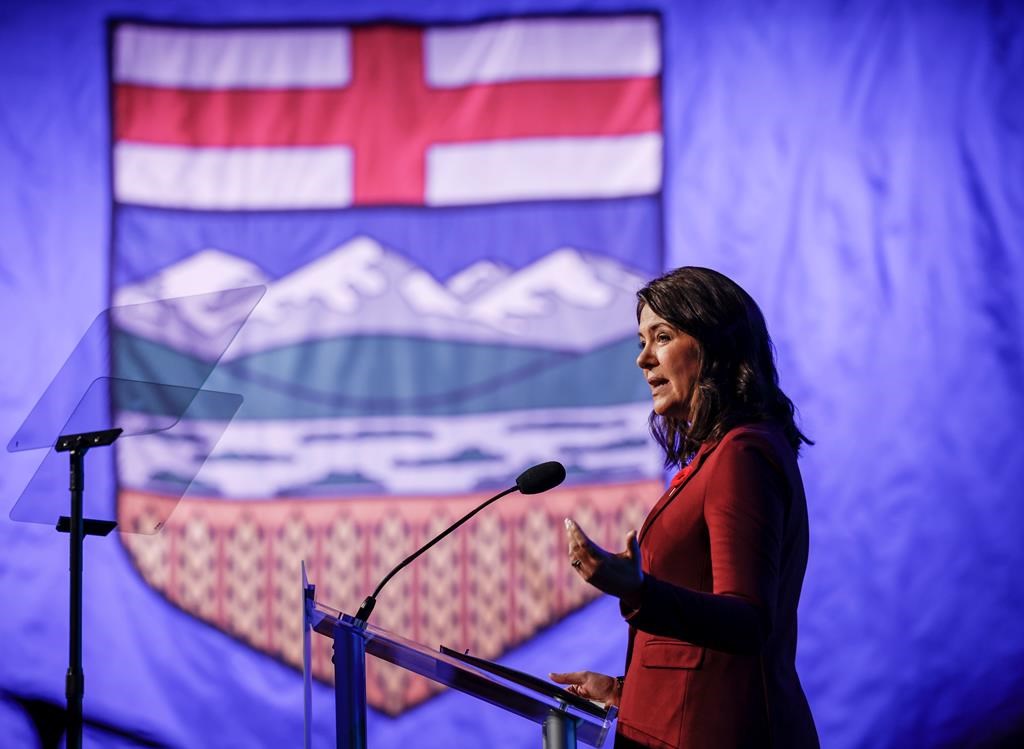Alberta Sovereignty Act: Province could explore electricity Crown corporation, deny validity of Clean Energy Regulations

Posted Nov 27, 2023 2:55 pm.
The province says the introduction of the Sovereignty Act in the legislature Monday is necessary to keep Albertans from “freezing in the dark at -30 C.”
Its introduction formally starts the process for Alberta to reject federal Clean Energy Regulations not set to come into effect for more than a decade.
The federal Liberals’ Clean Energy Regulations (CER), spearheaded by Environment Minister Steven Guilbeault, would require Canada’s electricity grid to be net-zero by 2035.
Alberta Premier Danielle Smith has long been a fierce opponent of the proposition, saying the timeline is unrealistic and proposing a 2050 deadline instead.
But the time for amicable discussion has passed, after the premier said on her weekend radio show she “had it’ with Guilbeault.
“We have tried to work with Ottawa to align their emissions-reduction efforts with our provincial plan to achieve a carbon-neutral power grid by 2050,” Smith said Monday.
“Unfortunately, after months of meetings, they continue to reject this opportunity and remain committed to an absurdly unrealistic and unattainable goal of a net-zero power grid by 2035.”
The United Conservative government claims that the move to net-zero will force Albertans into “brownouts, blackouts, and soaring costs.”
It also says that the clean energy regulations “have created uncertainty and are driving away investment.”
It adds that Alberta’s grid needs more baseload power from natural gas, but that it hasn’t received enough applications for new natural gas power plants because of investor uncertainty driven by the feds’ “extreme policies.”
If passed, the resolution to the Sovereignty Within a United Canada Act, would order all provincial entities to not recognize the validity of, enforce, or co-operate with the implementation of the CERs, to whatever length is legal.
This order wouldn’t apply to private companies or individuals.
Read more: Alberta Premier Danielle Smith to use Sovereignty Act on proposed energy regulations
The province’s resolution to the Act also asks the government to work with the Alberta Electric System Operator, the Alberta Utilities Commission, and others, to put into action “various reforms” to the province’s electrical system “to ensure grid affordability and reliability.”
The UCP also wants to work with industry, regulators, and other groups to conduct a feasibility study of establishing a provincial Crown corporation as a solution to maintaining reliable and affordable electricity onto the grid, should private companies “find it too risky” to do so under the CERs.
A provincial Crown corporation would be a provincial entity and not recognize the regulations as constitutionally valid, according to the government.
If needed, the corporation would work with industry and other stakeholders to bring more power to the grid, either through building new generation or purchasing existing power-generating assets, according to the province.
Assets purchased would be those that private industry wouldn’t otherwise build or would close “due to the uncertainty and penalties established by CERs.”
Alberta says Canadians should be prepared if and/or when the introduction of CERs leads to divestment in natural gas generation and “power plants being turned off in 2035.”
The resolution also urges the government to use all legal means necessary to oppose the federal electricity regulation, including legal challenges.
Smith’s government reiterates that the legislation and regulation of electricity is the responsibility of the province under Section 92A of Canada’s Constitution.
And, despite push back on the current proposed CER timeline, Alberta has said it isn’t against the idea of introducing cleaner energy to the grid, and, has actually reduced its’ electricity emissions by 53 per cent since 2005.
The UCP says Alberta would face “disproportionate risk and costs” compared to other provinces, as a result of CERs, according to an analysis by the Alberta Electric System Operator,
It also claims following the federal government’s electricity approach could cost as much as $1.7 trillion.
Reactions pour in
Opposition NDP leader Rachel Notley spoke to media before heading into the legislature Monday afternoon, saying that Smith and her party are “putting their own extremist politics ahead of economic common sense.”
“Albertans want to move forward, but Danielle Smith and the UCP are holding us back with the so-called Sovereignty Act. The UCP is invoking a dishonest and illegal stunt that jeopardizes investment certainty, breaches treaty rights across the country, weakens national unity, and embarrasses Albertans on the global stage,” she said.
“Energy experts, investors, and forward-looking Albertans all believe we can and should achieve net zero much sooner than 2050, which would attract billions in investment and create thousands of jobs,” Notley continued. “Instead, Danielle Smith and the UCP are leaving trillions of dollars in potential investment on the table and risking all the jobs that could come with it.”
Speaking to CityNews ahead of the Act’s introduction in the legislature, political scientist Lori Williams said it’s hard to say why Smith is making moves now.
“Legislation that’s targeted on something that doesn’t yet exist — perhaps, again, it’s a negotiating tactic to try to push it a particular direction,” she said. “I suspect it’s much more political, it’s much more about the public perception than it is about what it would ever actually accomplish.”
Political scientist Duane Bratt says he thinks Smith’s government is choosing to attack because of recent losses the feds have suffered in court.
“Quite frankly, I think Smith has wanted to use this for a while and this now seems like the perfect opportunity for her,” he explained. “There’s a lot of public anger toward Trudeau, the Trudeau government has lost some recent court cases involving provincial jurisdiction.”
There is plenty of uncertainty surrounding the Act, including how it will hold up in Canada’s highest courts.
-With files from Logan Stein










